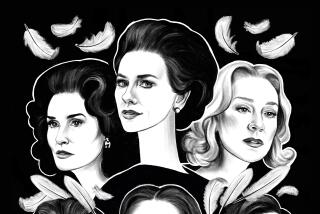TV REVIEW : A Startling, Flamboyant ‘Tru’ on PBS
- Share via
One of the great theatrical comebacks in recent Broadway history--Robert Morse’s startling performance in “Tru”--airs on “American Playhouse” at 9 tonight (on KCET-TV Channel 28 and KPBS-TV Channel 15).
Morse’s tour de force performance in the darkly flamboyant, one-man play about the life of Truman Capote garlanded baskets of laurels, including the 1990 Tony Award.
We encounter a bedeviled and incredulous Capote, alone in his towering Manhattan apartment. He’s just been rejected by his high-society friends. Dumped and banished is more like it.
Smartly exploiting the use of close-ups, the camera freezes on a New York magazine article resting on Capote’s coffee table. “Capote in Hot Water,” the headline blares. It’s Christmastime, 1975, Esquire has just published a dishy chapter from his roman a clef , “Answered Prayers,” and Capote is amazed that his elite friends the Paleys, the Vanderbilts and other celebrated confidants have totally ostracized him for revealing their secrets in print.
“I’m a writer!” Capote protests, flapping his arms (a gesture Morse humorously applies throughout the play). What did these people expect? “Did they think I hung around them for their intellectual company?”
But, plainly, Capote--the artist/outsider who thrived on being the darling of the elite--is deeply hurt, albeit assured that his dear, offended friends will take him back (they never did). Yet life’s not all grim. His phone is constantly ringing, he’s just partied with Ava, and now Carol Matthau is on the line.
Battling fresh scars of social abandonment, demons of ghosts past and the lure of that shiny liquor bottle across the room, it’s a precarious time in his life. His final decline is some while off, but playwright (and original stage director) Jay Presson Allen, working from the author’s letters and private papers, foreshadows the fading light of “The Tiny Terror,” as some called him.
Alternately impish and melancholy, Morse, like a genie, transforms himself into an uncanny likeness of Capote. Although abetted by Kevin Haney’s remarkable makeup design and employing a wispy, piping voice, Morse is no mere impersonator. He’s reached too far under Capote’s skin for that.
Capote’s famous, book-lined U.N. Plaza apartment is faithfully re-created by set designer David Mitchel as the action unfolds over the course of two nights before a dazzling picture window overlooking the East River and Gotham’s glittering lights twinkling below.
The TV experience, however, doesn’t compare to absorbing that lavish scenic design in a theater. On the other hand, “American Playhouse” veteran Kirk Browning’s television direction arguably enhances the play’s more emotional moments. The most notable example is when Capote, after a memory-laden stream-of-consciousness binge, suddenly picks up a painting of his younger self and smashes his fist through the canvas.
Taped during the show’s run at the Shubert Theatre in Chicago last November (after a sold-out stand here at the Henry Fonda Theatre), the production retains Morse’s beaming curtain call when he steps out from the wings and removes his wig and foamy facial makeup.
Happily, this is no chronological “and-the-next-thing-I-did” kind of autobiographical drama. Instead we’ve been invited in to help decorate the big tree, and Capote’s words, humorous and poignant, scatter the air: His “Christmas Memory” Southern childhood, his by-the-seat-of-the-pants philosophical turns (“Our end is consequent on our beginnings” . . . “Good taste is the death of art”) and some Big Apple snobbery (“It’s a fact that for every year you live in California you lose two IQ points. It’s redundant to die in L.A.”).
More to Read
The complete guide to home viewing
Get Screen Gab for everything about the TV shows and streaming movies everyone’s talking about.
You may occasionally receive promotional content from the Los Angeles Times.






